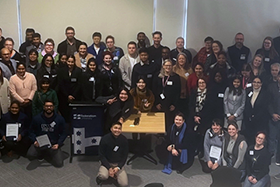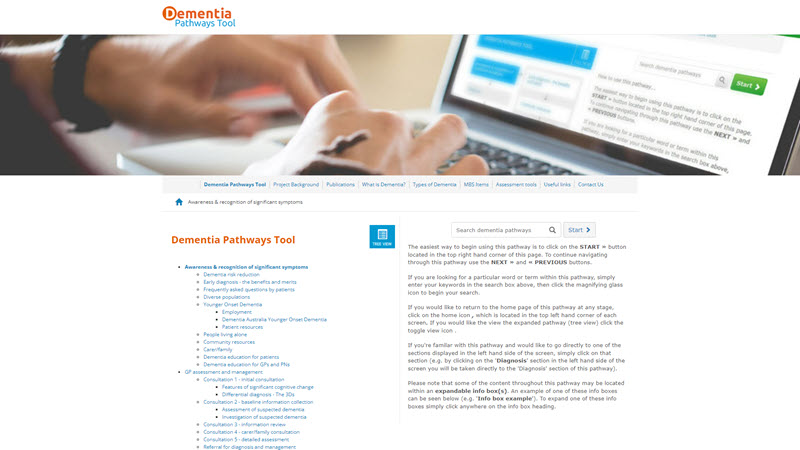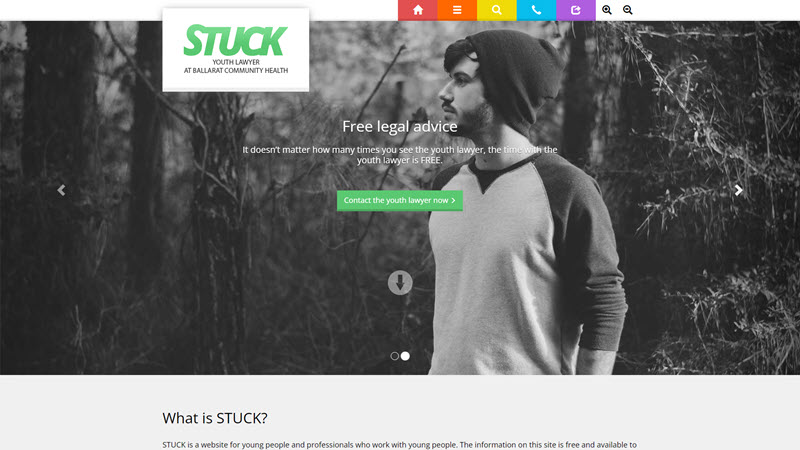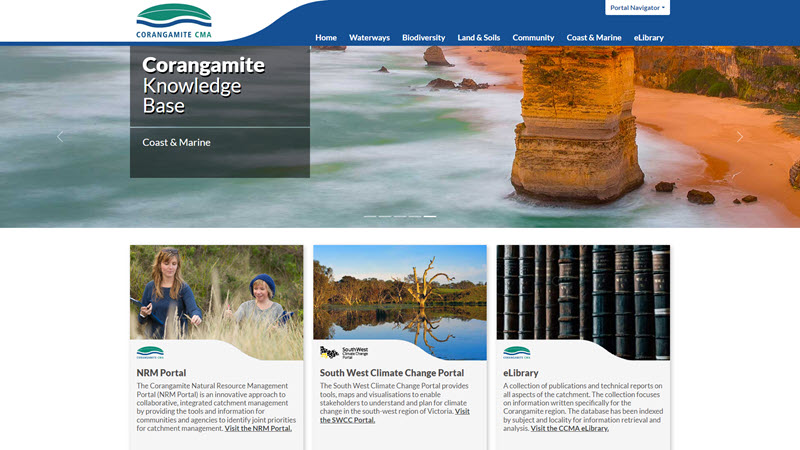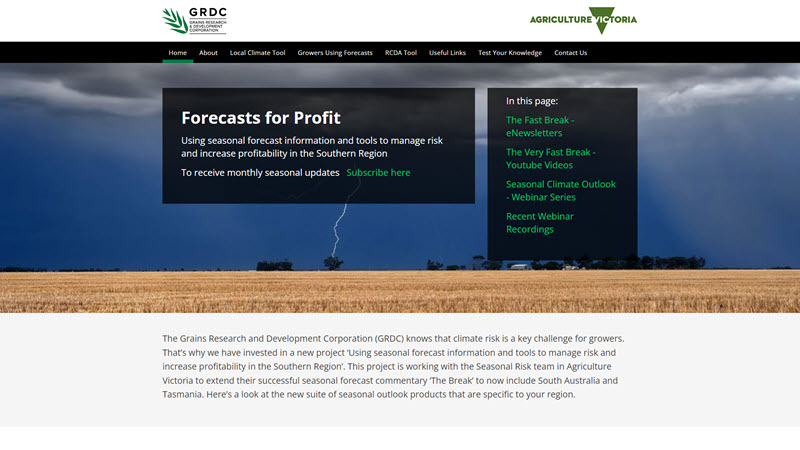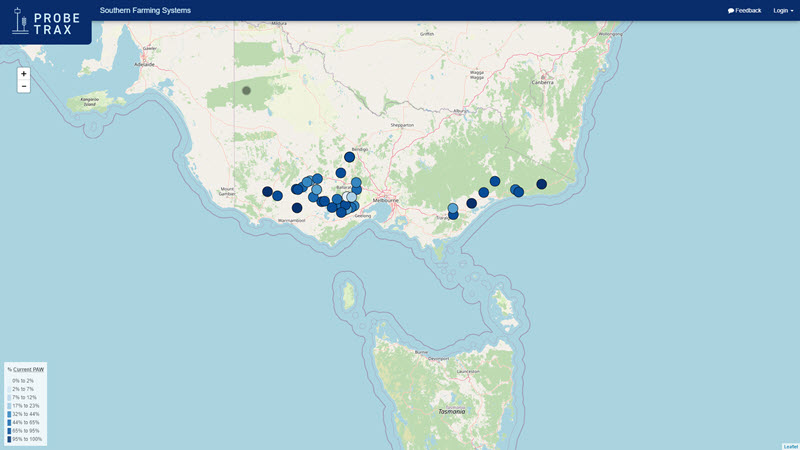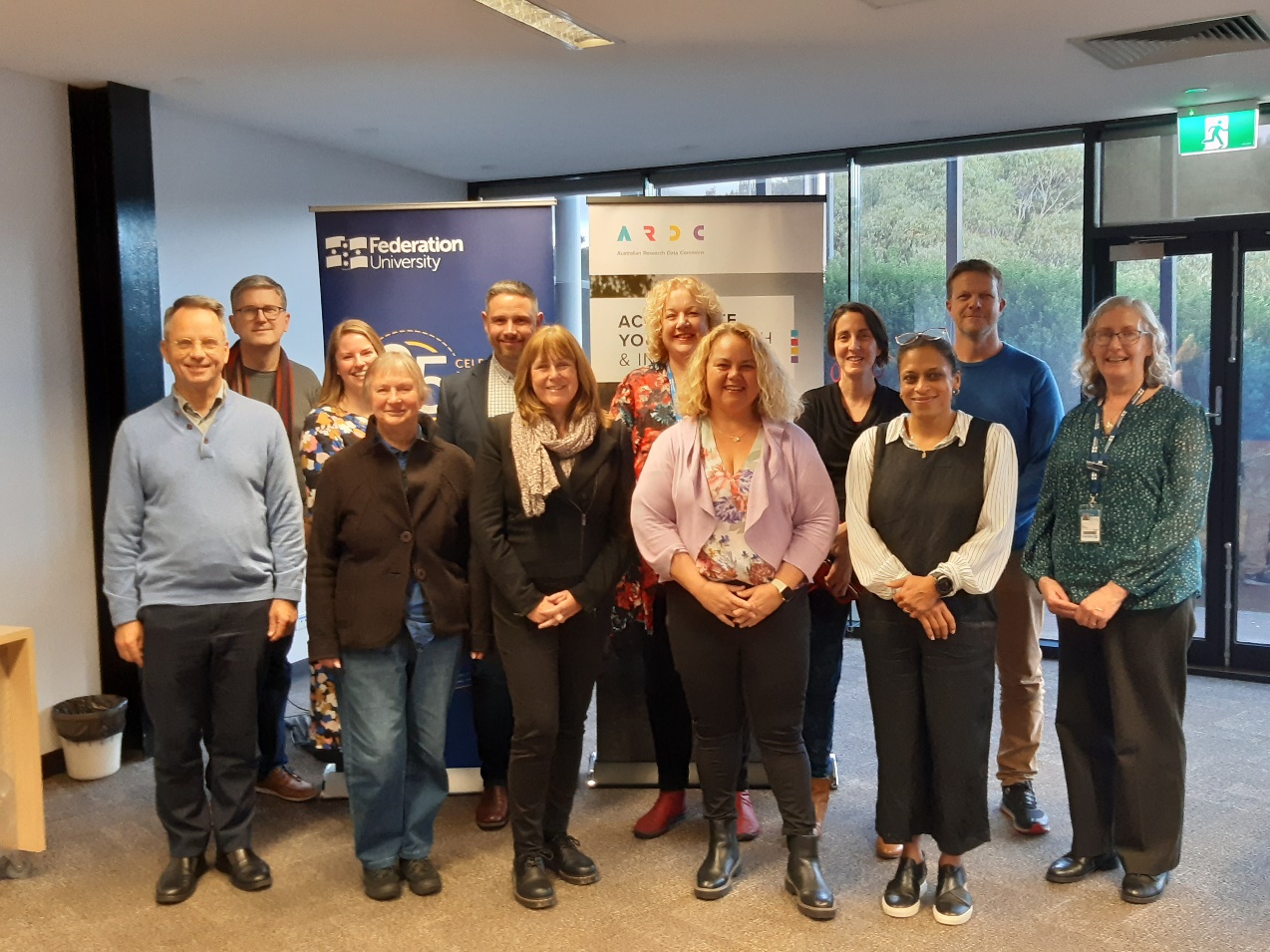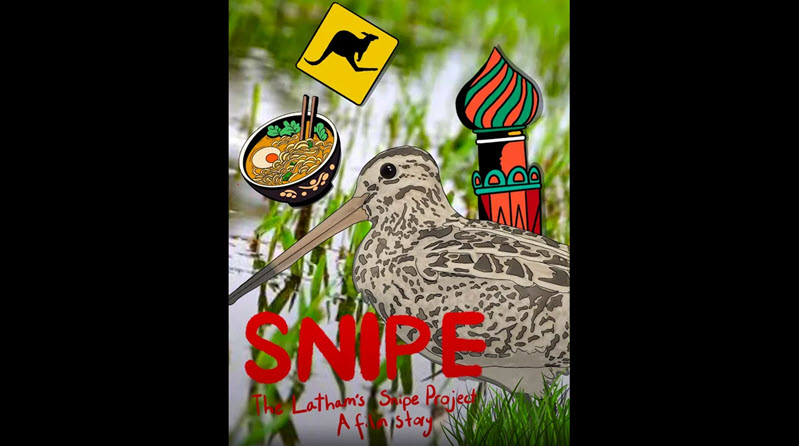CeRDI Newsletter Winter 2024
CeRDI 25-year anniversary special: The best CeRDI projects
We have been showcasing some of the many projects that have marked CeRDI’s successful 25-year anniversary. In this issue, we’ll continue to focus on projects that demonstrate the unique and important research and technology that characterise CeRDI’s 25-year journey. These exemplify our ongoing success as a leader in eResearch, involving important, long-term collaborations with industry partners.
Soil Interoperability Experiment
This was a significant international project, with collaborations involving CeRDI, the Open Geospatial Consortium, CSIRO and member organisations, globally. The project led to the development and testing of a global soil markup language that contributed to a soil encoding standard enabling the exchange of soil feature data, including data about soil bodies, profiles, horizons and related entities. This was a milestone project elevating CeRDI’s international reputation and building strong and enduring collaborations with the CSIRO and other organisations, worldwide.
-
Dementia Pathways Tool
The Dementia Pathways Tool  is a publicly accessible resource providing primary health care professionals and the community with a web-based repository containing information and resources for the assessment, referral, and management of people with dementia. Launched in 2013, the Tool is the only online dementia resource in Australia for practice nurses, and was one of the first online pathways in Australia for dementia management and care for general practitioners. Numerous updates to its content ensure the Tool remains relevant, informed through collaborations with lead experts including A/Prof Mark Yates and Caroline Gibson from Grampians Health. The project also led to key research collaborations and outputs with journal publications in the Australian Family Physician
is a publicly accessible resource providing primary health care professionals and the community with a web-based repository containing information and resources for the assessment, referral, and management of people with dementia. Launched in 2013, the Tool is the only online dementia resource in Australia for practice nurses, and was one of the first online pathways in Australia for dementia management and care for general practitioners. Numerous updates to its content ensure the Tool remains relevant, informed through collaborations with lead experts including A/Prof Mark Yates and Caroline Gibson from Grampians Health. The project also led to key research collaborations and outputs with journal publications in the Australian Family Physician  , and The Australian Journal of Rural Health
, and The Australian Journal of Rural Health  .
.
Central Highlands Health Justice Partnership
Funded by the Victorian Legal Services Board, in partnership with Ballarat Community Health, this project  delivered an integrated health justice service to improve the legal, health and wellbeing outcomes for disadvantaged young people. Facilitating an early intervention and raising awareness of the impact of legal problems on the health and wellbeing for the region’s youth was a key objective of the program. Led by A/Prof Marg Camilleri, in collaboration with CeRDI, this was one of the first health justice partnership programs for youth delivered in regional Australia. Research from the program continues to be published, most recently: https://www.publish.csiro.au/PY/PY22266
delivered an integrated health justice service to improve the legal, health and wellbeing outcomes for disadvantaged young people. Facilitating an early intervention and raising awareness of the impact of legal problems on the health and wellbeing for the region’s youth was a key objective of the program. Led by A/Prof Marg Camilleri, in collaboration with CeRDI, this was one of the first health justice partnership programs for youth delivered in regional Australia. Research from the program continues to be published, most recently: https://www.publish.csiro.au/PY/PY22266 
Family Violence Data portal
This project, a collaboration with the Central Highlands Integrated Family Violence Committee, supported the development of Data Press, a regional family violence spatial data portal. CeRDI was instrumental in developing the portal, which draws together a variety of data to support comprehensive demographic and service user profiles and the generation of community profiles based on service needs, drivers and impacts of family violence. The project established important collaborations with key organisations across the Central Highlands.
Corangamite Catchment Management Authority Knowledge Base
The Corangamite Catchment Management Authority (CCMA) Knowledge Base  is an extensive collection of publications and technical reports delivered online for the Corangamite region. The Knowledge Base was tailored to assist the CCMA with their business efficiencies and linking to key land and soil, water, marine and coastal, and community resources. Core documents in the knowledge base include information and resources from local government and water authorities. The online tool, developed by CeRDI, ensures that information is categorised and collated centrally around key areas and themes. The Tool has been widely used and well received.
is an extensive collection of publications and technical reports delivered online for the Corangamite region. The Knowledge Base was tailored to assist the CCMA with their business efficiencies and linking to key land and soil, water, marine and coastal, and community resources. Core documents in the knowledge base include information and resources from local government and water authorities. The online tool, developed by CeRDI, ensures that information is categorised and collated centrally around key areas and themes. The Tool has been widely used and well received.
Precision Agriculture Soli Platform
Precision Agriculture is one of Australia’s most experienced agriculture technology providers. In 2017, the company initiated a long-term research collaboration with Federation University to accelerate the adoption of precision farming techniques in Australia. This collaboration has led to the co-creation of an innovative, bespoke decision support platform, Soli  , which offers agronomy professionals direct access to detailed data about soil nutrient levels, specific to location. Soli has significantly increased the capability and efficiency of Precision Agriculture’s farm management and advisor support across broad acre cropping, horticulture, viticulture, and pasture-based systems. Soli is supporting greater industry partner productivity and improved commercial outcomes. The project has enhanced CeRDI’s reputation and expertise in digital agriculture decision-support systems. A co-designed extension to the research collaboration for the next three years is now underway.
, which offers agronomy professionals direct access to detailed data about soil nutrient levels, specific to location. Soli has significantly increased the capability and efficiency of Precision Agriculture’s farm management and advisor support across broad acre cropping, horticulture, viticulture, and pasture-based systems. Soli is supporting greater industry partner productivity and improved commercial outcomes. The project has enhanced CeRDI’s reputation and expertise in digital agriculture decision-support systems. A co-designed extension to the research collaboration for the next three years is now underway.
Forecasts for Profit
This project  involved the collation of information from project partners to meet the needs and support the Australian grains industry. Led by Agriculture Victoria, the project was implemented in response to climate variability which poses a major risk to profitability for grain grower in the southern regions of Australian. CeRDI contributed to the project by supplying innovative web resources and seasonal forecast information, packaged specifically for farmers in the Grains Research and Development Corporation southern region. This was a novel project and generated important and lasting collaborations with state governments.
involved the collation of information from project partners to meet the needs and support the Australian grains industry. Led by Agriculture Victoria, the project was implemented in response to climate variability which poses a major risk to profitability for grain grower in the southern regions of Australian. CeRDI contributed to the project by supplying innovative web resources and seasonal forecast information, packaged specifically for farmers in the Grains Research and Development Corporation southern region. This was a novel project and generated important and lasting collaborations with state governments.
Southern Farming Systems Probetrax
The Southern Farming Systems (SFS) soil probe network portal (ProbeTrax)  was established to monitor and assess soil temperature and moisture conditions from 62 soil probes, installed across the major soil types of the high rainfall zones of Victoria and Tasmania. CeRDI developed the web platform to display current and historical soil moisture and temperature values across the probe network, enabling this information to be provided in a way which is decision useful for farmers. This was the first telemetered big data challenge and provided learnings which have supported subsequent projects. ProbeTrax data was also used by CeRDI’s Peter Weir in his PhD research: https://www.cerdi.edu.au/cb_pages/peter_weir.php
was established to monitor and assess soil temperature and moisture conditions from 62 soil probes, installed across the major soil types of the high rainfall zones of Victoria and Tasmania. CeRDI developed the web platform to display current and historical soil moisture and temperature values across the probe network, enabling this information to be provided in a way which is decision useful for farmers. This was the first telemetered big data challenge and provided learnings which have supported subsequent projects. ProbeTrax data was also used by CeRDI’s Peter Weir in his PhD research: https://www.cerdi.edu.au/cb_pages/peter_weir.php
Rangelands Carbon
The Rangelands Carbon project  is supported by the Food Agility Cooperative Research Centre with the aim of transforming how rangeland farmers estimate, manage and trade carbon. CeRDI is collaborating on the project, together with the Australian Agricultural Company (AACo; Australia’s largest beef producer), the University of Technology Sydney, Charles Sturt University and three technology partners: Cibo Labs, Mullion Group, and Carbon Link. As part of this project, CeRDI researchers are leading the data stream, and the natural capital stream. These project areas are leading to new research insights and collaborations.
is supported by the Food Agility Cooperative Research Centre with the aim of transforming how rangeland farmers estimate, manage and trade carbon. CeRDI is collaborating on the project, together with the Australian Agricultural Company (AACo; Australia’s largest beef producer), the University of Technology Sydney, Charles Sturt University and three technology partners: Cibo Labs, Mullion Group, and Carbon Link. As part of this project, CeRDI researchers are leading the data stream, and the natural capital stream. These project areas are leading to new research insights and collaborations.
Youth Changing Alcohol Norms (Youth C.A.N.)
Commencing in 2016, this project was funded by VicHealth. Horsham Rural City Council coordinated the project to inform an understanding of alcohol consumption and misuse by young people in the region and identify opportunities for cultural change to reduce alcohol use. CeRDI conducted in depth research that informed strategies and interventions to shift cultural norms in the consumption of alcohol by young people. The project became an exemplar that featured in VicHealth’s Alcohol Cultures Guide to Risky Drinking Cultures  . The research was published in the Australian Journal of Rural Health
. The research was published in the Australian Journal of Rural Health  , and was later highlighted in the journal editorial
, and was later highlighted in the journal editorial  exemplifying key research linking to practice within communities.
exemplifying key research linking to practice within communities.
Empowering research with data catalogue for grains industry
This story was prepared by, and published by the Federation University Newsroom, 11 June 2024
Federation University's Centre for eResearch and Digital Innovation (CeRDI) has played a key role in developing a national data catalogue that will give researchers access to years' worth of information and accelerate the release of new technology and knowledge in the grains industry.
The Grains Research and Development Corporation (GRDC) recently launched the GRDC Data Catalogue  - a tool that aims to simplify finding large quantities of grains research, development and extension (RD&E) data generated by GRDC's investments over the past 20 years.
- a tool that aims to simplify finding large quantities of grains research, development and extension (RD&E) data generated by GRDC's investments over the past 20 years.
-
GRDC manages hundreds of RD&E projects at any given time, most of which generate new data like yield, soil, genetic, weather and other experimental data. GRDC’s Data Catalogue houses metadata describing the data assets, information on how to find them, and the ability to request access from GRDC's research partners.
CeRDI's involvement in the project began in mid-2022 when the team began developing a tool to enable GRDC's research partners to enter metadata about their data assets into the catalogue.
Federation librarian Peggy Hsu, who joined CeRDI for the project, says GRDC was keen to develop the data catalogue to bring the information together and create high reuse value from that information.
"We found that many research partners had their most valuable datasets lurking on people's computers or internal systems that weren't easily findable and had the very distinct possibility of becoming lost forever," she said.
"GRDC had co-owned and co-invested in all of these datasets, and wanted to have that transparency with their research partners - it was very much about making the data FAIR (findable, accessible, interoperable and reusable).
"We had to make sure that there were appropriate metadata attached to the records by getting each partner's internal infrastructure set up so that they could store the data in a public-facing repository so that it could be accessed. But not everything can or should be accessible publicly, but at least the metadata records could be."
Challenges included working with datasets from partners across universities, state governments and other organisations, each with different legislative requirements.
The data will be stored and managed by GRDC's research partners and made discoverable through the GRDC Data Catalogue's singular portal.
The metadata records in GRDC’s Data Catalogue are outputs from GRDC’s Data Partnerships Initiative that engaged 12 GRDC research partners to generate high-value metadata records to populate the GRDC Data Catalogue and build data management expertise and capacity.
CeRDI research coordinator Jennifer Corbett says there were plenty of meetings with GRDC to determine what was needed for the project and monthly community-of-practice meetings with the research partners.
"The community of practice enabled the sharing of knowledge and expertise - there were librarians from some organisations, researchers with particular expertise in agriculture, as well as people with IT skills," she said.
"You've got all these different domains coming together and helping each other, some from universities and others from state government departments – there was a lot of growth in the community as the project went on."
She says CeRDI prepared resources to support research partners developing high-quality, high-value metadata records that met GRDC's and broader sector needs.
"We provided research partners with guidance and support while the digital catalogue system was being developed by GRDC’s technology partner.
"The Federation team led the work to confirm GRDC requirements and then provided tailored metadata creation tools and resources to support research partners in creating high quality descriptions of the co-owned data and other resources that have been generated through GRDC supported research."
GRDC research data manager Dr Washington Gapare says GRDC’s Data Catalogue will increase the visibility of GRDC co-owned data assets and ultimately improve tender applications and research outcomes.
"Special thanks to the Federation University team for their assistance in every aspect of the Data Partnerships Initiative," he said.
Related reading:
Bridging the gap between research and real-world needs 
Supporting data sharing to improve food security 
Federation University becomes ARDC’s first regional host institution
This story was prepared and published by the ARDC, 1 July 2024 
The Australian Research Data Commons (ARDC) has welcomed Federation University Australia, Australia’s leading regional university, as a new host institution.
Federation University already supports the ARDC and the Australian Government’s National Collaborative Research Infrastructure Strategy (NCRIS) as an ARDC member.
In becoming a host institution, Federation University will now have ARDC staff based on campus. Due to the strong alignment, the new ARDC staff members will be based within the Centre for eResearch and Digital Innovation (CeRDI), located within Federation University’s Research portfolio. CeRDI is a global leader in data interoperability and promotes innovation through the application of new technologies through research, knowledge transfer and commercial activities.
-
The initial cohort of staff will be supporting the delivery of the ARDC’s 3 Thematic Research Data Commons: People, Planet, and HASS and Indigenous Research Data Commons. The ARDC’s new HR Business Partner is also based at Federation University.
This evolution of the relationship between Federation University and the ARDC will only increase the benefit for researchers both on campus and nationally.
“Becoming ARDC’s first regional host institution marks a significant milestone for Federation University,” Prof. Helen Thompson, Director, Centre for eResearch and Digital Innovation, Federation University Australia.
“We look forward to contributing to ARDCs purpose of providing Australian researchers with competitive advantage through data.”
Rosie Hicks, CEO, ARDC said, “We’re thrilled to have Federation University join us as our first regional host institution.
“CeRDI recognises the importance of national research data management and has had a long association with the ARDC in developing digital research infrastructure and will continue this support in the delivery of the ARDC’s Thematic Research Data Commons infrastructure for Australian researchers.
“With Federation University coming on board as our first regional host institution, it will allow us to provide their researchers with access to national digital research infrastructure to support their cutting edge research, as well as providing skilled staff and partnership opportunities for the ARDC.”
Federation University has partnered with the ARDC to deliver several national research infrastructure projects.
It is currently leading on the ARDC’s Translational Research Data Challenge Food Security Data Sharing Initiative, which aims to improve data sharing practices between farmers and technology/service providers.
CeRDI at Federation University has also worked with the ARDC over many years to develop and improve the AgReFed platform, which enables researchers to search and discover trusted, reusable agriculture-related datasets, workflows and models. This facilitates data reuse and cross-discipline collaborations for novel research insights and practical applications in policy, reporting and on-ground decision making.
The ARDC is funded through the National Collaborative Research Infrastructure Strategy (NCRIS) to support national digital research infrastructure for Australian researchers.
ARDC CeRDI team
Federation University became ARDC’s first regional host institution with CeRDI chosen as the home of the new partnership. The partnership has enabled five existing CeRDI researchers the opportunity to join the work of this important groundbreaking national initiative through 12-month secondments. This includes:
Dr Megan Wong Project Manager, Planet RDC and Rob Milne, Program Manager, Planet RDC. Megan and Rob are both working on helping enable national-scale infrastructure for environmental and earth science researchers, policymakers, decision-makers, and research data managers. They have been identifying opportunities and facilitating stakeholder engagement to uplift FAIR data capability (Findable, Accessible, Interoperable, and Reusable) across the Planet Research Data Commons and partners. A large part of their roles have been facilitating the co-design for establishing ‘trusted data and information supply chains’ for priority regional use cases, which includes collaborations between the Australian Government Department of Climate Change, Energy, the Environment and Water (DCCEEW), national research infrastructures, state agencies, industry partners, Traditional Owners, universities, research institutions and researchers.
-
Jude Channon: Project Manager, People RDC. In this role Jude is contributing to a range of projects in the digital health and health data spaces. The work is providing Jude with the opportunity to leverage her management and research skills, while learning new concepts in the health research space. Jude is contributing to cutting edge ideas and working to solve significant data challenges for the health sector.
Dr Carolyn Staines: Project Manager, People RDC. In this role Carolyn is contributing her expertise to support a range of projects in the digital health and health data space. Carolyn is optimising her skills across new concepts in the health research space, and is contributing to cutting edge research ideas through collaborations that solve significant data challenges for the health sector.
Jennifer Corbett, Project Coordinator. Jennifer is an integral member of the Program Design and Delivery team which is part of the National Coordination business unit. I am working in the Humanities, Arts and Social Sciences (HASS) and Indigenous Research Data Commons (RDC) which is producing national-scale data infrastructure for HASS and Indigenous research data communities. My role is to support, liaise, and engage with ARDC Program Managers, Project Managers, the Project Management Office, and project partners to deliver projects that significantly advance the RDC. I contribute to projects across the six focus areas of the HASS and Indigenous RDC: Improving Indigenous Research Capabilities, Connections, Language Data Commons of Australia, Social Sciences, Creative Arts, and the Australian Internet Observatory.
This research/project is supported by the Australian Research Data Commons (ARDC). The ARDC is funded by NCRIS.
New tool highlights valuable urban wetlands
This story was prepared by, and published by the Federation University Newsroom, 12 June 2024
Urban wetlands are vital for supporting clean water, healthy ecosystems and bird migration but are often considered less valuable from an urban planning perspective in biodiversity conservation because they are highly modified or constructed bodies of water.
A Federation researcher has teamed up with the Atlas of Living Australia (ALA), the Australian Urban Research Infrastructure Network (AURIN) and BirdLife Australia to develop a new tool that aims to shed light on the often overlooked but essential role of urban wetlands in our cities.
-
The mapping tool, Valuing Urban Wetlands  , integrates waterbird and landscape data to assess the health and importance of urban wetlands in the Greater Melbourne region.
, integrates waterbird and landscape data to assess the health and importance of urban wetlands in the Greater Melbourne region.
The tool allows users to explore the world of urban wetlands. It provides individual waterbody reports on frog and waterbird species present at the site, as well as threatened species.
Centre for eResearch and Digital Innovation (CeRDI) Senior Research Fellow and project lead Dr Birgita Hansen says the project started with her work with the Latham's Snipe, a migratory shorebird heavily reliant on wetland habitats.
Latham's Snipe breeds in Japan and migrates to Australia for the non-breeding season. Research has revealed high numbers of snipe in some Victorian urban wetlands despite the bird being generally difficult to observe.
Dr Hansen has led citizen science efforts monitoring the snipe for several years and says the tool identifies the wetlands vital to the snipe and many other species.
"One of the aims of the Latham's Snipe project was to try and build more awareness in the public about wetlands in urban areas – you often have degraded looking swamps and marshes that people don't see any value in," Dr Hansen said.
"But these wetlands provide important refuge habitat for various species in our cities, including the vulnerable Latham's Snipe. We developed this tool to help raise awareness of the biodiversity value of small urban wetlands by presenting snapshots of data recorded by citizen scientists."
Dr Hansen says partnering with AURIN, which focuses on built environments and urban infrastructure, and the ALA, which focuses on biodiversity and citizen science, allowed the research team to combine those elements.
The tool integrates waterbird and landscape data. Waterbird data collected through citizen science and professional science, including Birdlife Australia and eBird, is accessed via the ALA and overlayed with open landscape data to create metrics for assessing wetland health and importance.
"This was an opportunity to build a system around those two themes which are relevant to Latham's Snipe because we've got a species that occurs in wetlands in urban areas and we've got citizen scientists collecting the data," Dr Hansen said.
The mapped area is based on Melbourne Water's boundary and extends as far as the Yarra Ranges. Dr Hansen hopes to expand the tool to include Geelong and Ballarat in the future.
Dr Hansen says that by providing quantitative data on the value of urban wetlands, the project can inform better land use and development decision-making, which can lead to better protection of these crucial habitats.
Dr Hansen says an example of this is an abandoned industrial site on the outskirts of Ballarat that has supported nationally significant numbers of Latham's Snipe every year for the last four years. The land is currently being developed and the fate of displaced birds is uncertain.
"This is exactly the situation I am trying to capture with this tool – here is a wetland that a bird that is now listed as vulnerable under national legislation is using through our summer, but no one knows about it," Dr Hansen said.
"For many people, this is just a wasteland that will soon be covered by concrete.
"So the project is about trying to build that awareness in people. When you look at a water body in an urban area, it doesn't mean it's garbage, it might actually have significant biodiversity value."
To access the Valuing Urban Wetlands online portal  , enter the wetland name or scroll across the map to zoom into an area and click on a wetland of interest to generate an area report. The report will list all frog and waterbird species in this wetland (based on the above data sources) and the number of threatened species.
, enter the wetland name or scroll across the map to zoom into an area and click on a wetland of interest to generate an area report. The report will list all frog and waterbird species in this wetland (based on the above data sources) and the number of threatened species.
Related reading:
This bird’s stamina is remarkable: it flies non-stop for 5 days from Japan to Australia, but now its habitat is under threat 
Harnessing the power of many 
Latham Snipe research: Documentary and podcast
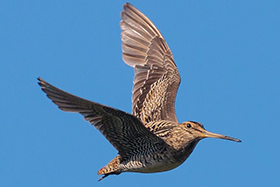 |
|
|
Latham's Snipe, a migratory shorebird.
Image: Jacob Crisp
|
|
| |
|
The Latham's Snipe research, led by CeRDI’s Dr Birgita Hansen, has been featured in a new documentary film, and an informative podcast. The Latham’s Snipe (Gallinago hardwickii) is a shorebird that migrates to Japan from Australia to breed each year. Until recently relatively little was known about the Latham’s Snipe compared to other migratory shorebirds, but the research efforts of Birgita and colleagues has helped unlock new insights about this unique and cryptic species.
The documentary film was written, directed and produced by Richard Snashell and showcases the extensive research efforts to monitor, understand and protect the Latham Snipe. In the video, Birgita and colleagues discuss their work and the extensive citizen scientist efforts over many years to improve knowledge about this species. The documentary was shortlisted for the Far South Film Festival in August 2024 at Merimbula. The film’s viewing was attended by Birgita, her PhD student and colleague Lori Gould and Richard. As part of the festival, Richard was involved in a film directors Q&A, and this provided the whole team with the opportunity to talk more about the film and the project.
-
A podcast about the Latham’s Snipe project was released by the Weekend Birder earlier in the year. This half-hour episode delves into the life of this unique migratory shorebird. The podcast develops the narrative by focusing on Birgita’s passion for ornithology and directly her research skills to investigate the Latham Snipe. The podcast highlights the important role that technology, environmental science and citizen science is having on the research being undertaken. Birgita is a world expert on Latham’s Snipe having conducted a decade of research on the species. This has to led to a range of communication outputs including publications, keynote presentations at international conferences, and involvement on committees and advisory boards about this important bird to protect its key habitats.
To access the podcast: https://www.weekendbirder.com/episodes/79-lathams-snipe-with-birgita 
Snipe documentary: https://www.youtube.com/watch?v=uKouzoQmspY 
Peel to Prest receives Maggolee Award
The "Yarrowee River History: Peel to Prest" project, which offers a comprehensive exploration of the historical and cultural significance associated with the Yarrowee River, encompassing the influences of the Wadawurrung Indigenous people and subsequent settlement, recently received a Maggolee award. The project was led by Federation University historian Dr David Waldron, and supported by CeRDI, which contributed to the technical specifications and design of the web portal for the project.
Gold discoveries were located around the Yarrowee River and its tributaries. During this time, substantial redirection of water channels occurred, aligned with the management of natural drainage for the river. This served multiple purposes, including directing water flow to the gold diggings, removing sludge build up and eventually assisting with mitigating the impact of floods across Ballarat as buildings were constructed following on from its tent city origins. Integral to the project’s success has been the incorporation of first nation’s history. The portal includes statements and content supplied by the Wadawurrung Traditional Owners Aboriginal Corporation (WTOAC) and highlights the connection of the Yarrowee River and its place of significance for First Nations People. The content was guided in its development by the Caring for Country subcommittee of WTOC.
-
The project was successful in its award nomination and was granted the Maggolee Award in May this year. These awards celebrate good practice in Victorian local government around Aboriginal engagement and reconciliation. Peel to Prest was nominated as a co design project involving the Wadawurrung Traditional landowners in which an improved understanding of the history of the Yarrowee River corridor was developed, incorporating its heritage significance. The award ceremony was held earlier this year, with David Waldron in attendance.
The project was funded by the City of Ballarat and the Victoria Drought Resilience Adoption and Innovation Hub. It focuses on enhancing the environmental quality, local habitat, and overall enjoyment for residents and trail users. It supports opportunities for the telling the multifaceted and diverse histories along the linear stretch of the river, from Ballarat’s CBD to the beginning of the unchanneled river course.
https://yarrowee.cerdi.edu.au/ 
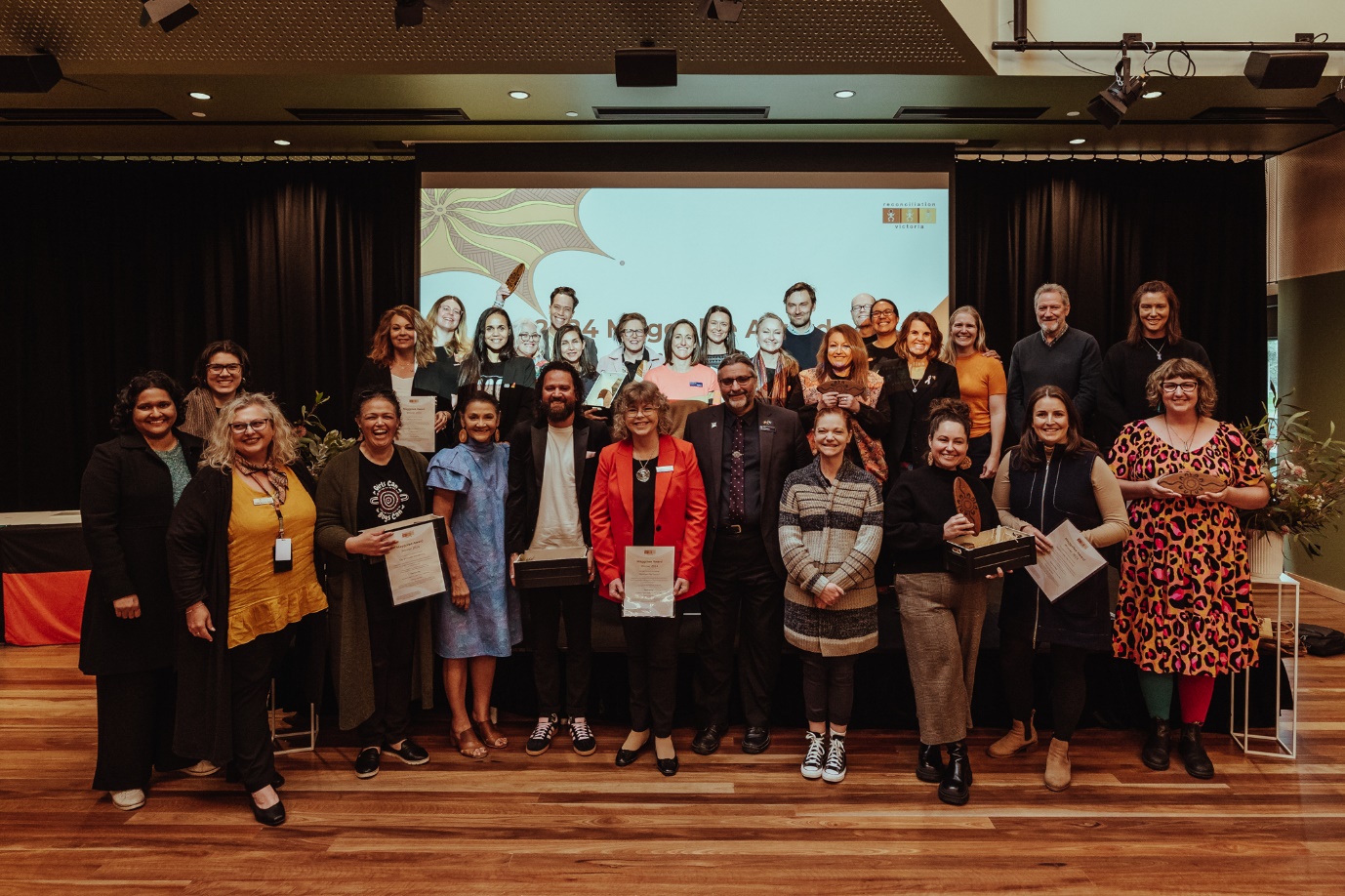 |
|
Pictured: Representatives from the 2024 Maggolee Award Winners with Emily Poelina-Hunter, Andrew Gunstone and Nicole Findlay.
|
Triple success: Seeding grants awarded to CeRDI researchers
Three CeRDI researchers received funding from the University’s Early Career Researcher (ECR) seeding grants to pursue their research projects. Dr’s Chris Bahlo, Aakansha Chadha, and Alison Ollerenshaw were successfully awarded funding to lead research in their chosen areas of expertise and interest. Chris is conducting collaborative research to extend the work she commenced during her PhD and the discovery of public datasets to inform welfare decisions associated with livestock farming. Aakansha is conducting research to investigate how different lime types and fractions of lime applied over soil surface affect soil pH at various depths over time. Alison will be examining the impacts and perceptions of the perennial Dementia Pathways Tools. Further details about these projects are described below.
-
Dr Chris Bahlo. Project title: Enabling the discovery of sheep welfare information from public datasets
This project is a collaboration between Dr Chris Bahlo (CeRDI)(lead investigator) and Dr Sarah Preston(HITC). It builds on research undertaken as part of Chris’ PhD thesis in relation to the discovery of public datasets that can potentially inform decision making for livestock welfare in extensive farming systems.
For this project, the first project task is a systematic search and review of public datasets related to sheep in Australia, which includes a FAIR analysis. The second part is the update of an existing livestock welfare portal (phoebus.cerdi.edu.au, which currently only displays datasets related to cattle) including the addition of new geospatial datasets found in the search. The project will also contribute to a proposed manuscript that describes the novel work related to using open data to inform livestock farmers to make better farm animal welfare decisions.
https://www.cerdi.edu.au/cb_pages/chris_bahlo.php
Dr Aakansha Chadha. Project title: A mechanistic model for surface applied lime and movement through soil
This project aims to address the global issue of acidic soils, which limit crop production by decreasing essential nutrient availability and increasing the toxicity of certain elements. In Australia, acidic soils result in significant losses in grain production, estimated at $400 million annually. The application of agricultural lime (calcium carbonate) is a known solution to mitigate soil acidity by raising pH levels, thereby enhancing nutrient availability, microbial activity, and crop productivity. However, understanding the precise movement of lime through soil and its long-term effects on soil pH is crucial. Recent research highlights the need for further investigation into soil profile pH changes resulting from surface-applied lime, forming the basis for this proposal.
This study, a collaboration between Southern Farming Systems and Federation University, will investigate how different lime types and fractions of lime applied over soil surface affect soil pH at various depths over time. The objectives include assessing the rate of lime movement, developing an empirical model for lime application, and optimizing soil pH to enhance crop productivity. The project will serve as a pilot study with existing resources and aims to establish a comprehensive mechanistic model for lime application in south-eastern Australia's agricultural soils. It aligns with Federation University's research priority on advancing agriculture and aims to benefit researchers, industry stakeholders, and local communities by improving soil health, agricultural productivity, and fostering sustainable farming practices. The project will also strengthen partnerships with industry groups like the Victorian Lime Producers Association and set the stage for future research funding opportunities.
https://www.cerdi.edu.au/cb_pages/aakansha_chadha.php
Dr Alison Ollerenshaw. Project title: Impact of the Dementia Pathways Tool
This research will investigate the perceptions of online users of the Dementia Pathways Tool, an enduring, online tool for dementia diagnosis, management, and referral used by primary health care practitioners in the Grampians region. The content for the Tool was informed by Assoc Prof Mark Yates, Geriatrician, Grampians Health, and Caroline Gibson, Grampians Health and the University of Newcastle who established the practice nurse resources on the DPT. CeRDI designed the digital platform and has hosted and supported the regular and ongoing updates to the Tool. The grant will explore what factors contribute to its value and ongoing use of the Tool. The research will also examine how the Tool and its content could be expanded to ensure it meets the needs of practitioners and others in the future. This research will provide a prototype for conducting similar research to understand how these online information systems that have been co-developed with CeRDI can be continually and seamlessly maintained and improved for broad and long-term benefit.
https://www.cerdi.edu.au/cb_pages/alison_ollerenshaw.php
New online tool simplifies farm data sharing contracts
It will now be easier for farm businesses and those who collect, manage and share their data to access an industry best-practice contract for data sharing - thanks to a new digital tool.
The online Data Sharing Agreement (DSA) Tool is free to use and has been developed in partnership with Food Agility CRC, tier one legal firm Minter Ellison, Federation University and the Australian Research Data Commons.
Food Agility Data Policy Manager Gabi Ceregra said data use and sharing is important for improving the productivity of farming, but producers need assurance about how their data is collected and used.
-
“There are multiple data sharing agreements out there, not all of which cover the essential aspects of data sharing, nor provide fair terms to farm businesses sharing their data. Just like we have standard residential tenancy contracts, an industry standard data sharing agreement to protect farm businesses provides assurance and protection,” said Ms Ceregra.
The DSA Tool digitises the hard-copy Data Sharing Agreement Template released in 2023, making it easier for users to customise data sharing contracts.
“It’s designed for contracts with only a few parties, for example a farm business and a research institute, a farm business and a processor, or a farm business and another farm business,” she said. “The tool can be used to inform any other data sharing contracts such as software terms and conditions, or non-farm business contracts between collaborators or project partners.”
The DSA Tool has been three years in the making, with feedback received from Food Agility projects and other stakeholders. It’s also aligned with the National Farmers' Federation's Australian Farm Data Code  (the Code) to provide data protections for farmers.
(the Code) to provide data protections for farmers.
More information is available on the Food Agility website and the online tool is hosted by Federation University.
The DSA Tool was delivered through the Data Sharing Initiative project  which received investment from the Australian Research Data Commons (ARDC)
which received investment from the Australian Research Data Commons (ARDC)  through its Food Security Data Challenges program. The ARDC is enabled by the National Collaborative Research Infrastructure Strategy (NCRIS)
through its Food Security Data Challenges program. The ARDC is enabled by the National Collaborative Research Infrastructure Strategy (NCRIS)  .
.
Source: New online tool simplifies farm data sharing contracts | Media Release | Food Agility CRC 
Staff profile: Tamsin Wilson, ARDC Human Resources Business Partner
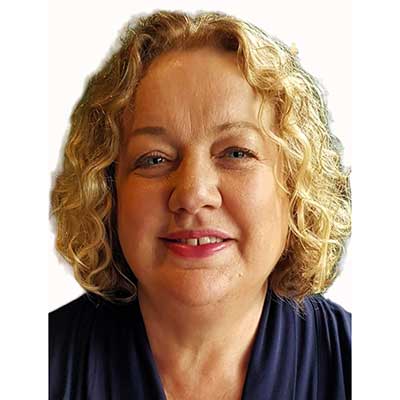 |
|
|
ARDC Human Resources
Business Partner,
Tamsin Wilson
|
|
| |
|
Tamsin recently commenced as the Human Resources Business Partner for the ARDC, located in CeRDI. In this role, Tamsin will build and manage a fit for purpose HR function to support the ARDC’s people and culture programs and processes now and into the future. Areas of focus include staff culture, performance, engagement, learning and development and workforce planning as well as day-to-day human resources functions and services. This is done in partnership with Host Institutions, in this case Federation University, which govern the overarching HR policies and employment conditions where ARDC staff are located.
Tamsin’s background in Human Resources spans more than 30 years across government and the not-for-profit sector. Her career has encompassed learning and development and organisational development specialist roles as well as broader HR leadership roles. At Deakin University, she successfully established a new university-wide staff learning and development program and worked with Academic and professional staff on a range of staff engagement and performance improvement programs. In local government she developed and implemented a new workforce planning framework to support the organisation to navigate its workforce needs and challenges. Her most recent role was with a not-for-profit organisation in Melbourne as People & Capability Manager where she expanded and improved the broader HR program.
Tamsin recently moved to Ballarat and is enjoying the benefits of a regional lifestyle.
Higher Degrees by Research profile: Hannah Faraone
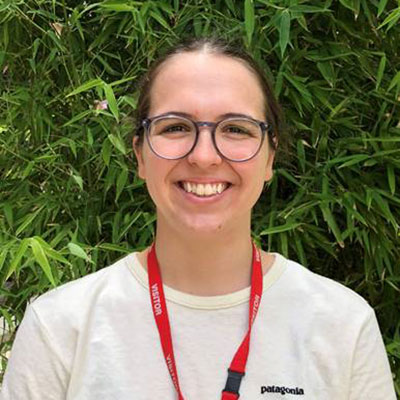 |
|
|
PhD Candidate,
Hannah Faraone
|
|
| |
|
Research title: The impact of macrolitter on birdlife in the Port Phillip Region and Greater Melbourne
Hannah commenced her PhD with CeRDI in 2024 in collaboration with RMIT University and the Department of Energy, Environment, and Climate Action (DEECA). Her research will explore the relationship between anthropogenic litter and birdlife in the Greater Melbourne region. This will include field and desktop investigations into the types of interactions that occur (i.e., ingestion, entanglement, use as nesting and breeding material), as well as the related impacts (i.e., mortality, injury, breeding success). This PhD research draws on previous work completed by CeRDI and DEECA, including the creation of the database, LitterWatch  (a state-government initiative used to collect litter data from Victorian community groups that is consistent and comparable). The PhD will also include a 3-month internship with DEECA that will involve supporting the management and maintenance of the LitterWatch portal.
(a state-government initiative used to collect litter data from Victorian community groups that is consistent and comparable). The PhD will also include a 3-month internship with DEECA that will involve supporting the management and maintenance of the LitterWatch portal.
Prior to commencing her PhD, Hannah completed a Bachelor of Science and Honours degree at RMIT University (2022) and a Graduate Certificate in Environment from The University of Melbourne in 2023.
Hannah’s PhD supervisors include Dr. Birgita Hansen (CeRDI; Principal supervisor), Dr Nick Schultz (Federation University; Associate supervisor) and Dr. Jackie Myers (RMIT; Associate supervisor), and Kimberley MacDonald (DEECA; Industry supervisor).
https://www.cerdi.edu.au/cb_pages/hannah_faraone.php
News snippets
Soil Network on Knowledge (SNOK) webinar: In late July, Pete Dahlhaus delivered a SNOK webinar to the network about soil data relating to the VAS project and included additional data to support soil carbon management such as climate, rainfall, Soil moisture, inherent soil fertility. These webinars showcase soil data tools and resources to determine land suitability for soil carbon projects in NSW.
Past SNOK webinars are available at: https://www.youtube.com/playlist?list=PL4zlvcUKKUmUAMbe1lhHOXZL6Kq2i1izI 
-
VAS in the spotlight during Soil CRC APEC Food Security meeting in Peru: Soil CRC CEO Dr Michael Crawford representing Australia at an APEC meeting on Food Security in Trujillo, Peru. The Asia Pacific Economic Cooperation forum which brings together 21 countries (or economies) to discuss best practice, exchange experiences and promote collaboration on various topics of mutual interest, in this case food security. He presented some of the Soil CRC’s research in a workshop on “Addressing Food Security Challenges by Promoting data-driven Policymaking”. The workshop was organised by the Japanese Government, and featured speakers from Japan, China and the USA, as well as Australia. Dr Crawford spoke about the Soil CRC and the research achievements of the Visualising Australasia’s Soils project led by Associate Professor Peter Dahlhaus at Federation University and the Social Benchmarking project led by Dr Hanabeth Luke at Southern Cross University. For more information: https://soilcrc.com.au/soil-crc-at-apec-meeting/?mc_cid=9ed3343e6e&mc_eid=0fea0a45fe 
Recent outputs and publications
Hansen, B. (2024) Australia’s new threatened migratory shorebird species. Transects issue 19, pp. 6-9. Newsletter of the Ecological Consultants Association of Victoria. https://ecavic.org.au/resources/eca-victoria-newsletterdraft/ 
Ollerenshaw, A., Murphy, A., McLaren, S., & Thompson, H. (2024). The integral role of incubator managers in supporting tenants’ positive psychological wellbeing. Small Enterprise Research, 1-24. https://doi.org/10.1080/13215906.2024.2362670 
Senanayake, I.P., Yeo, I-Y., Robinson, N.J., Dahlhaus, P.G., & Hancock, G.R. (2024). Identification of high-performing soil groups in grazing lands using a multivariate analysis method. Soil Security, 100163. https://doi.org/10.1016/j.soisec.2024.100163 
Weir, P., & Dahlhaus, P. (2024). Merging weather radar and rain gauges for dryland agriculture. Journal of Southern Hemisphere Earth Systems Science, 74, ES23023. doi:10.1071/ES23023 
ARDC Leadership Forum: The Australian Research Data Commons (ARDC) recently held its second leadership forum for 2024 on the Skilled Research Infrastructure Workforce: Pathways and Support to Enable Effective Research. The forum brought together key stakeholders in the research sector to discuss pathways and support to address digital skills gaps to enable effective research. The expert forum panel included CeRDI Director Prof Helen Thompson, together with Julie Rothacker, Australian Catholic University, Dr Tim Rawling, Auscope, Professor David Powell, Monash University and A/Professor Nic Geard, University of Melbourne. The panel discussed digital research skills and pathways and support that help address digital skills gaps to enable effective research.
For further information and to view a recording from the forum: https://ardc.edu.au/article/the-skilled-research-infrastructure-workforce-pathways-and-support-to-enable-effective-research/ 
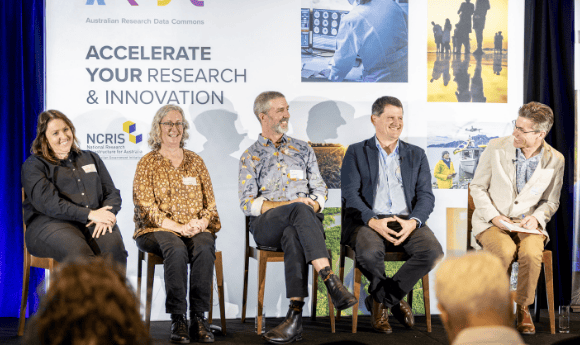 |
|
Above image, from L to R: Julie Rothacker, Australian Catholic University, Helen Thompson, Federation University, Tim Rawling, Auscope, David Powell, Monash University and Nic Geard, University of Melbourne at the ARDC leadership forum, May 2024 (photo courtesy ARDC).
|
Victorian Hub Drought and Innovation: Drought Resilience Showcase. A forum highlighting the Victorian Hub's work in drought-resilience was delivered in Geelong in June. The Victorian Drought Resilience Adoption and Innovation Hub was created in 2021 to address the challenges posed by drought in Victoria. It brought together an expert team of researchers, policymakers, and stakeholders to develop innovative solutions and support for those affected by drought, achieving vital outcomes for our landscapes, communities and farmers.
A range of projects from Hub partners were showcased during the event. CeRDI was represented at the event by Dr Carolyn Staines who delivered a presentation on digital solutions for agriculture and focusing on the implications for soil health for surface spraying effluent. The presentation reported back on an important project that was conducted of piggery effluent. For more information about this project: https://www.cerdi.edu.au/PiggeryEffluent
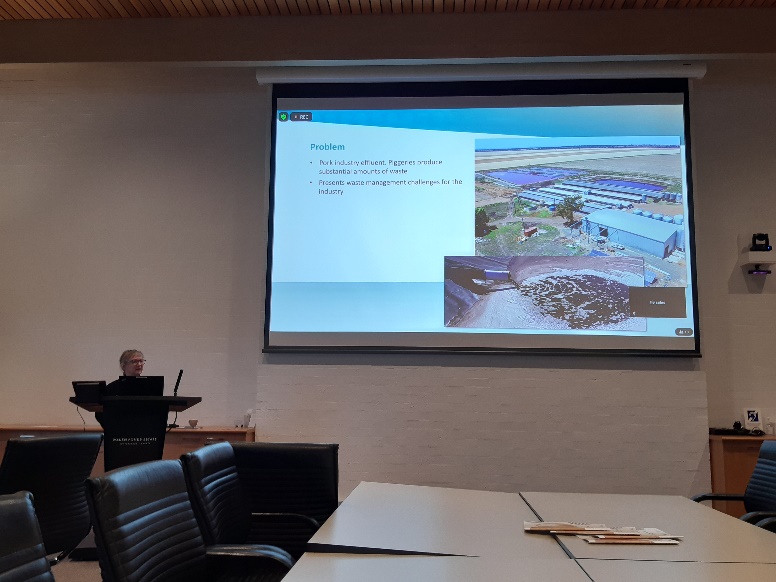 |
|
Above: Carolyn presenting at the Drought Resilience Showcase in Geelong in June.
|
HDR news
CeRDI PhD Candidate Success: Visualise your Thesis
Over 130 Higher Degree by Research (HDR) candidates, HDR supervisors, collaborators, and Federation staff and students recently attended the Mt Helen Campus for the Graduate Research School’s annual HDR conference.
The conference celebrates and promotes the work of HDR students, providing an opportunity for them to showcase the range, diversity, and strength of their research.
Twenty-eight oral presentations and 16 posters were delivered by candidates throughout the day.
CeRDI’s Hannah Faraone came a very close second (by 1 point!) in the Visualise Your Thesis competition. Hannah’s video can be viewed at: https://www.cerdi.edu.au/cb_pages/hannah_faraone.php
-
Emerging Technology Hub Seminar series: The August presentation was delivered by HDR candidate Pramod Gautam on his PhD research: Achieving net zero emissions in agriculture: Developing decision support systems for land and enterprise managers.
The presentation will elaborate on different aspects of the study and provide insights into detail objectives, methodology and expected outcomes:
Global anthropogenic greenhouse gas (GHG) emissions are increasing steadily, making the goal of achieving net zero a significant challenge. About 30% of global GHG emissions are from food systems. In Australia, agriculture sector contributes 17.9 % to the total emissions and must therefore respond effectively to achieve net zero emissions by 2050. This study aims to develop a conceptual model for a decision support system (DSS) tailored to GHG management in agriculture. It intends to integrate stakeholder perspectives, scientific knowledge, and technological advancements based on decision rules. This will inform development of a conceptual model for a tailored DSS that will be evaluated at the farm level. This model will serve as a roadmap for a decision-making tool to manage GHG emissions at the farm level, with the goal of supporting sustainable agricultural production without compromising productivity and profitability. This study will assess existing DSS and then conduct online survey and interviews to collect qualitative data on the perceptions of farmers, researchers, agriculture consultant and policymakers. After assessing DSS and perception of stakeholder, conceptual model will be developed for appropriate decision-making tools to achieve net zero and evaluated at farm level.
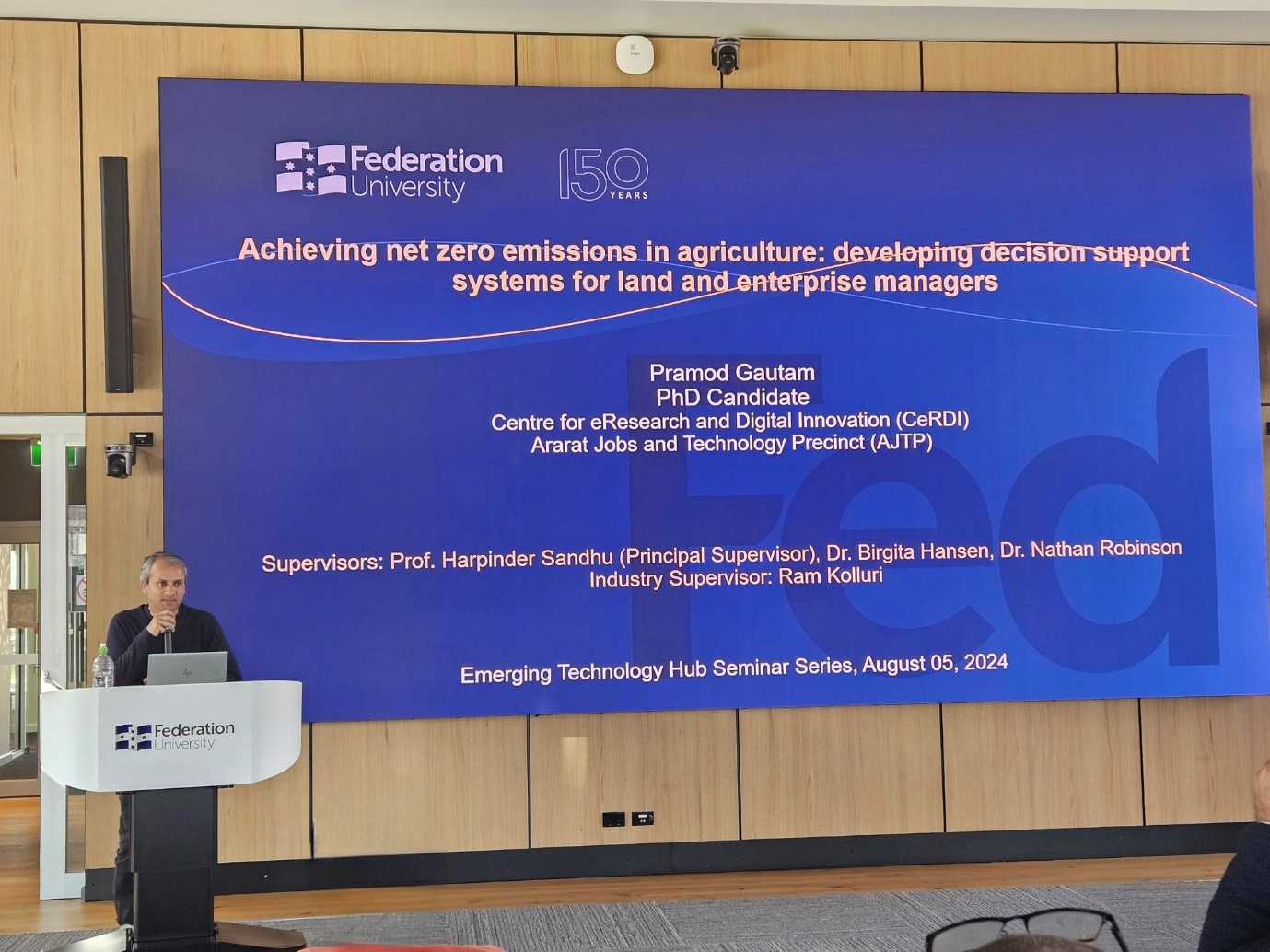 |
|
Above: Pramod delivering his presentation during the Emerging Technology Hub Seminar series
|
About CeRDI
The Centre for eResearch and Digital Innovation (CeRDI) is a research centre at Federation University Australia focused on:
- the application of information and communications technology (ICT) and the development of innovative, world class knowledge management systems;
- significantly advancing the digital literacy and knowledge management capabilities of partner organisations;
- fostering partnerships for the development and implementation of eResearch with industry, government and academia; and
- measuring the impact of eResearch and digital innovation through longitudinal research.
Contact CeRDI
For further details about CeRDI’s diverse portfolio of research please visit our website: www.cerdi.edu.au, or contact Director, Associate Professor Helen Thompson: h.thompson@federation.edu.au
Mailing Address
Centre for eResearch and Digital Innovation
Federation University Australia
PO Box 691
Ballarat Vic 3353
Office Location
Suite 15, Greenhill Enterprise Centre
Ballarat Technology Park
University Drive
Mount Helen Vic 3350
Phone: +61 3 5327 9314
Email: support@cerdi.edu.au
Subscribe to the CeRDI Newsletter Mailing List
I would like to subscribe to the CeRDI Newsletter Mailing List to receive notifications of future CeRDI Newsletters.
If you have any feedback, please email newsletter@cerdi.edu.au

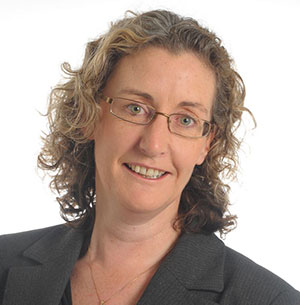
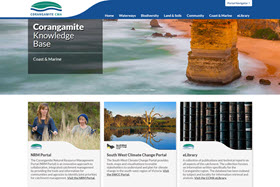
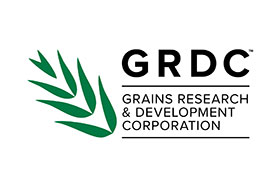
![]() - a tool that aims to simplify finding large quantities of grains research, development and extension (RD&E) data generated by GRDC's investments over the past 20 years.
- a tool that aims to simplify finding large quantities of grains research, development and extension (RD&E) data generated by GRDC's investments over the past 20 years.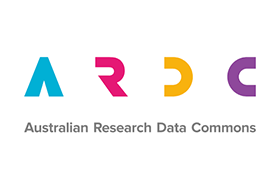
![]()
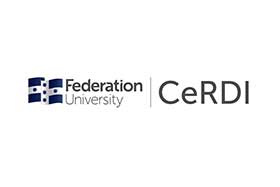
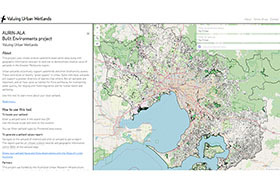

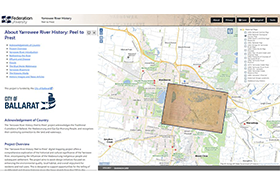

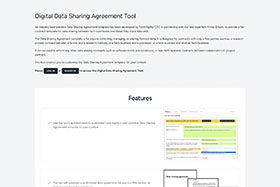


![]() (a state-government initiative used to collect litter data from Victorian community groups that is consistent and comparable). The PhD will also include a 3-month internship with DEECA that will involve supporting the management and maintenance of the LitterWatch portal.
(a state-government initiative used to collect litter data from Victorian community groups that is consistent and comparable). The PhD will also include a 3-month internship with DEECA that will involve supporting the management and maintenance of the LitterWatch portal.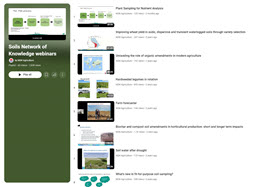
![]()
